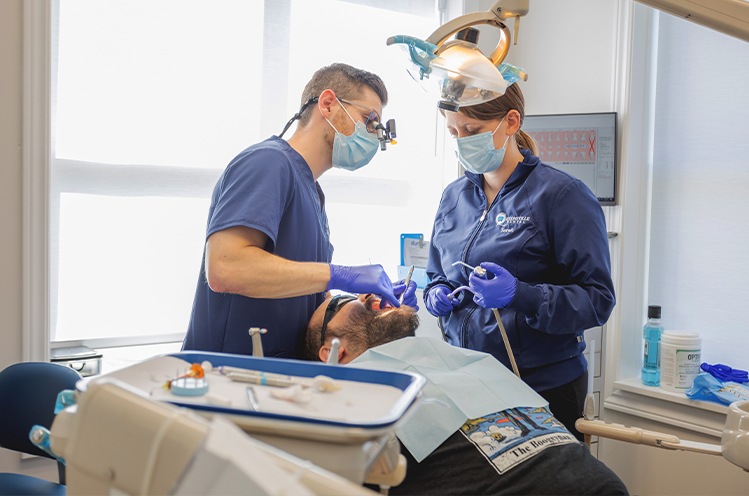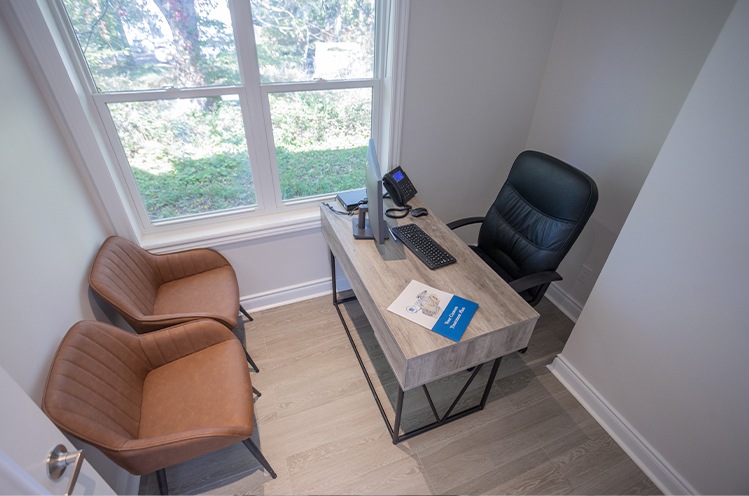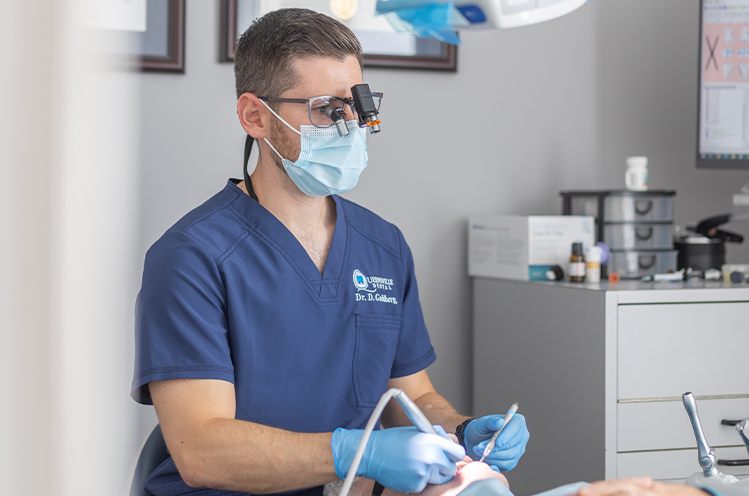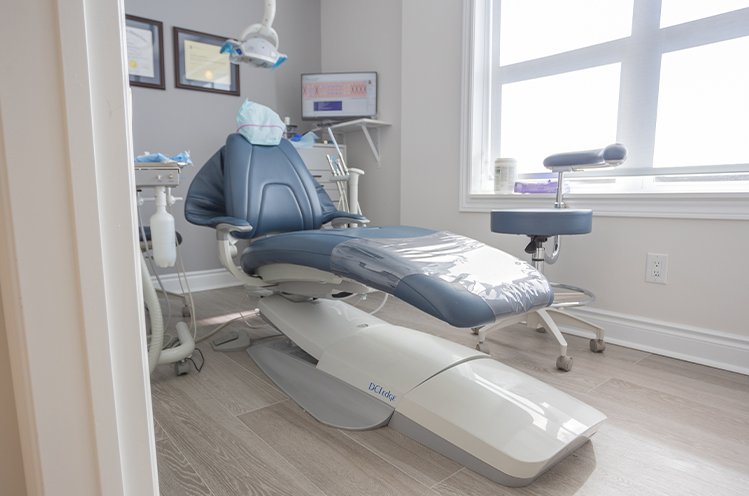Emergency Dentistry – East Gwillimbury, ON
Dealing with Pain? Let Us Help!
Not all dental emergencies are preventable, but you can take proactive steps to minimize the risk. You can also have the reassurance that your emergency dentist in East Gwillimbury, ON at Queensville Dental is here to help when you’re faced with a serious dental injury. All you need to do is call our dental office right away, and we’ll work to schedule an appointment as quickly as possible. No matter the situation, we can deliver timely care in-house, so you and your smile can get back on track. With same-day and weekend appointments available, you can trust that we will be here for you.
Why Choose Queensville Dental for Emergency Dentistry?
- Same-Day and Weekend Appointments Available
- Caring & Compassionate Dentist and Team
- Sedation Dentistry Available Upon Request
How We Treat Dental Emergencies

- Scheduling an appointment: Once you call our dental office to schedule an appointment, we will assess your situation over the phone to determine if a same-day visit is necessary. No matter the decision, we will offer helpful tips you can use at home to better manage your pain.
- Emergency exam: Our team will not only perform a visual examination but also take digital X-rays of your mouth to pinpoint the problem area. This will help us to have a better idea of the severity of the injury.
- Review findings: After compiling all the necessary images, we will develop a personalized treatment plan that includes recommended services to fix the problem. We’ll go over the details with you to ensure you are on board with the projected plan.
- Embrace a pain-free smile: Once you are satisfied with the suggestions of our team, we will start treating your smile. You can trust that we’ll also work to eliminate the pain first before addressing the underlying issue.
The Most Common Dental Emergencies
Many different scenarios may have you wondering if what you’re experiencing is an actual dental emergency. Although not all are easily recognizable, you can safely say that if you’re in pain, it’s best to call our dental office and alert us to the situation. Below are just a few of the many common dental emergencies we can treat in-house.
Understanding the Cost of Dental Emergencies

When a dental emergency occurs, your first thought is likely to be what you can do to eliminate the pain. It’s not until later that cost becomes a factor. Many patients, unfortunately, put off immediate treatment out of fear they cannot afford care, but the reality is that the longer you wait, the worse your symptoms will become. At Queensville Dental, we aim to keep our services accessible and affordable, and we’ll work with you to maximize your dental insurance benefits while also discussing available financing to keep out-of-pocket expenses at a minimum.
Keys to Preventing Dental Emergencies

While you can’t prevent all injuries, you should take appropriate steps to reduce your risk. From adopting good oral hygiene habits at home to eliminate bad oral bacteria to wearing a mouthguard while playing sports, eating a healthy and nutrient-rich diet, and keeping regular dental checkups and cleaning appointments with our team, these preventive steps can make a difference when it comes to the health and longevity of your smile.
Root Canal Treatment

If the innermost layer of your tooth, the pulp, becomes damaged or infected by decay, you’re likely to feel significant pain. The reason is that this area consists of nerves and blood vessels, triggering immense discomfort should it be irritated. When this happens, the only viable solution is to perform a root canal. Our team can go in and clear out the decayed and damaged canals while also removing the pulp. As a result, you can keep your natural tooth structure longer and improve your oral health for a brighter future.
Tooth Extractions

When root canal therapy and other restorative solutions are not enough to effectively treat and heal a damaged tooth, the only possibility is to remove it. Oftentimes, this recommended treatment option is the best course of action because a problematic tooth can pose a serious issue for the rest of your smile if left untreated. Although tooth extraction is never our first option, it may be the only solution to better protect your smile.
Wisdom Tooth Extractions

Wisdom teeth, also known as third molars, typically erupt when an individual is between the ages of 17 and 25. While some people do not need to undergo the removal process of these teeth, most do require extraction. The reasons are many but often, the most common is the fact there is minimal space available inside the mouth for these molars. By removing them, we can lower your risk for dental alignment issues and better protect teeth that might be damaged by impacted and poorly aligned wisdom teeth.
TMJ Treatment

If chronic jaw pain is causing you to wake with regular headaches or is making it difficult to chew and bite down, you may be suffering from temporomandibular joint disorder (TMD). When the TMJs, which are connected to the base of the skull, become inflamed or injured, it can lead to serious pain throughout the jaw, neck, and even into the head. With a customized occlusal splint, we can bring the jaw into better alignment and allow for a more restful night’s sleep and a pain-free way of life.
Dental Emergency FAQs
Do Toothaches Go Away on Their Own?
When you have a sore muscle or a headache, often the best cure is to give it enough time to work itself out. Many patients assume that oral issues, like a throbbing tooth, will also fade in time, but that’s usually not true. If anything, dental concerns tend to worsen over time and require Dr. Goldberg’s intervention to halt their progress.
Furthermore, if you develop a severe toothache that suddenly dissipates, it could be a sign that your problem has gotten worse. There are several potential causes behind the pain you’re experiencing, though it’s likely that bacteria have penetrated the tender pulp inside your tooth to cause discomfort. If you wait too long to be seen, these germs can damage the nerve to the point that it is no longer responsive, though you will still require treatment to keep the disease from spreading.
Should I Visit for Minor Chips in My Teeth?
In some cases, you might be able to safely wait a day or two to contact our office in East Gwillimbury for seemingly minor damage to your enamel. However, it’s impossible to determine the extent of the damage on your own at home, because even hairline fractures can reach below the surface of your gums into the roots of your teeth.
Contact our team and let us know what happened so we can schedule an appropriate time to see you. When you arrive, we’ll examine your condition and take images or scans to get a comprehensive look at the underlying concern. Then, we’ll provide a customized treatment plan based on our findings, like restoring your teeth with dental bonding or crowns.
Is it Better to Go to the ER First for Dental Emergencies?
It’s natural to wonder if you might receive faster service if you head to the closest emergency room for urgent dental issues. In some cases, this is even preferred. For example, if you’ve sustained an injury that fractured or dislocated your jaw or has caused profuse bleeding that doesn’t slow or stop after 10 minutes, it’s best to head to the ER immediately.
However, if you develop a toothache, break a restoration, or have some other oral concern, it’s best to call our office for a same-day appointment. Emergency doctors don’t have the same specialized training as Dr. Goldberg, which allows him to quickly identify the cause of your problem and recommend solutions. Plus, our office is equipped with state-of-the-art technology intended to address dental issues that aren’t usually included in emergency rooms.
How Can I Sleep with Tooth Pain?
Dental emergencies often occur in the evening or on weekends when our office is closed, meaning you might need to wait a night or two to contact us. Unfortunately, toothaches often worsen when you lie down horizontally, which can keep you from getting some much-needed rest.
It might help to prop your head up on several pillows so that you’re positioned on an incline to keep blood from pooling painfully behind your already sore tooth. You can also try placing an ice pack on the tender side of your face for 15 minutes at a time for a temporary numbing reprieve. Finally, taking over-the-counter medications like ibuprofen and Tylenol is typically safe to alleviate aches and inflammation.
Family Dentistry Restorative Dentistry Dental Implants Cosmetic Dentistry Children's Dentistry Periodontal Therapy Sedation Dentistry View Our Services

